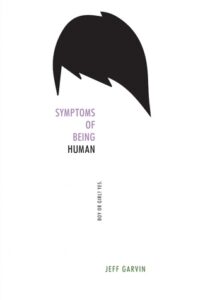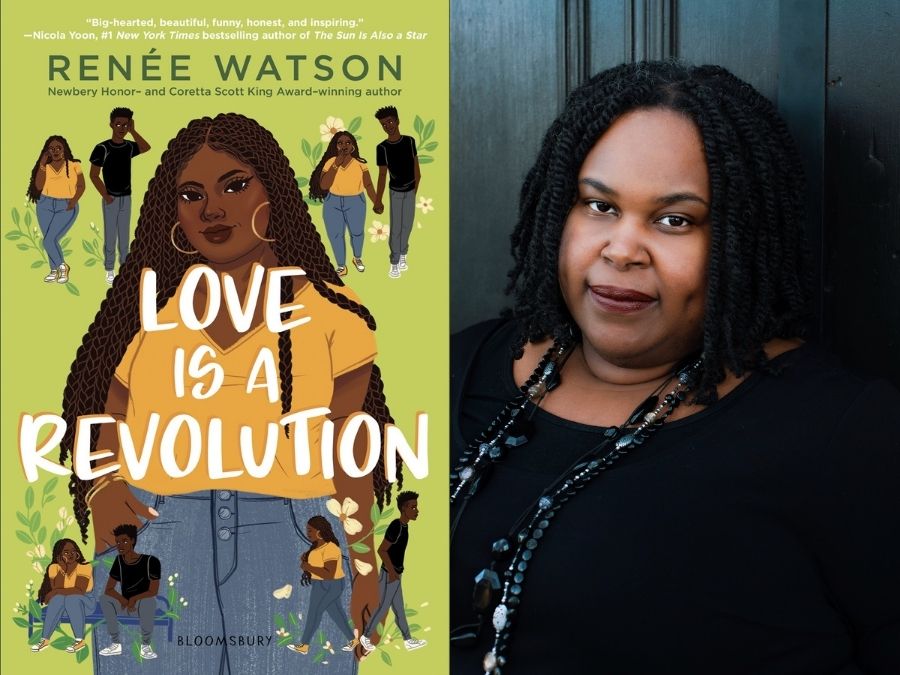Book Review: Symptoms of Being Human by Jeff Garvin
 Publisher’s description:
Publisher’s description:
Riley Cavanaugh is many things: Punk rock. Snarky. Rebellious. And gender fluid. Some days Riley identifies as a boy, and others as a girl. But Riley isn’t exactly out yet. And between starting a new school and having a congressman father running for reelection in über-conservative Orange County, the pressure—media and otherwise—is building up in Riley’s life.
On the advice of a therapist, Riley starts an anonymous blog to vent those pent-up feelings and tell the truth of what it’s really like to be a gender fluid teenager. But just as Riley’s starting to settle in at school—even developing feelings for a mysterious outcast—the blog goes viral, and an unnamed commenter discovers Riley’s real identity, threatening exposure. And Riley must make a choice: walk away from what the blog has created—a lifeline, new friends, a cause to believe in—or stand up, come out, and risk everything.
ADVERTISEMENT
ADVERTISEMENT
From debut author Jeff Garvin comes a powerful and uplifting portrait of a modern teen struggling with high school, relationships, and what it means to be a person.
Amanda’s thoughts
Well, that extremely thorough summary up there really hits most of the main pieces of this story. This is 100% the story of a gender fluid teen. That fact is at the heart of every piece of this plot. We read the term “gender fluid” over and over again as we learn exactly what that means to Riley. Readers who are unfamiliar with what being gender fluid means (or means to one person) will walk away with a pretty complex picture of this identity .
Riley is starting at a new school. Riley’s father is a congressman, which matters because he’s up for re-election and needs Riley to attend fundraisers and help his campaign by not rocking the boat further. Riley has recently attempted suicide and had a recovery stint in a psychiatric hospital. Riley’s anxiety and panic attacks are still a constant, but medication and therapy are helping with that. Riley hopes to start over at the new school, but is instantly called “it” or “tranny” and other slurs. “Is that a girl, or a guy?” kids whisper in the hall. It would appear that judgmental teenagers looking to figure out how they should categorize a person are all over the place. Go figure.
Riley makes two good friends, Solo (Jason Solomona) and Bec (self-named because of her prominent nose, “bec” being French for “beak”), though their friendships start out tenuously. Riley starts an anonymous blog as a way to connect with “people like me,” a suggestion from Riley’s therapist. The blog quickly gains traffic, especially after one of Riley’s replies to a reader goes viral when something unexpected happens. Riley is scared that someone will discover the blog and out Riley, but the community found there is too good to turn away from. Of course, you can probably see where this is going, right? Riley’s dad is a high-profile congressman. Riley is already being bullied at school. Riley isn’t out to Riley’s parents yet. Expect things to fall apart, especially when it appears that Riley has a stalker on the blog who may know Riley’s true identity.
I really liked this book for a lot of reasons. Riley spends a lot of time talking/thinking about being gender fluid. Riley talks about feeling neutral, or feeling more “boy” or “girl” on certain days, or “both” or “neither.” Riley talks about the body dysphoria and the various ways it makes Riley feel when Riley shifts between identities. There is a lot going on here about gender, identity, and assumptions, not just with Riley but with some secondary characters in the book, both at the support group Riley attends and at school. Solo and Bec are great characters—particularly Solo (who refers to himself as “the three-hundred-pound brown kid with the furry Chewbacca backpack”). He’s an absolutely fantastic character. Part of the football team, Solo, who initially really seemed to connect with Riley, falls to the pressure of his jerk peers. He doesn’t make fun of Riley or hurl slurs, but he distances himself from Riley and doesn’t stand up to his peers right away. It doesn’t take long for him to ditch that attitude, though, and be a real friend to Riley. As far as enemies go, the biggest one is Jim Vickers, the football-playing a-hole who goes out of his way to bully and threaten Riley. Things go from bad to worse (to really, really a lot worse) with him.
ADVERTISEMENT
ADVERTISEMENT
Riley’s anxiety and panic attacks are also described in great detail. We see Riley getting help through therapy, medication (complete with adjusting doses as things change and having backup medication for the particularly bad moments), and learning techniques to try to stave off anxiety—things like deep breathing, visualization, and more. We see how horrible the panic attacks can be. Riley is open about them and their affects. Mental health issues are also addressed with the character of Bec’s mom, who is deeply depressed after a tragic incident in their family.
Though the novel is about a lot of very serious things, Riley’s wry humor and easy banter with Bec and Solo help lighten the tone. Though Riley struggles with coming to terms with this identity and sharing it with others, Riley has a lot of support. Riley has compassionate friends, a caring online community, people in the support group who can relate, and loving (if sometimes judgmental and not understanding) parents.
The novel starts with a blog post. “The first thing you’re going to want to know about me is: Am I a boy, or am I a girl.” Of course, since Riley is gender fluid, we know those labels don’t apply or only sometimes apply. Garvin manages to successfully avoid all pronouns for Riley or any other indications of what gender Riley was assigned at birth, helping drive home points about identity. An author’s note discusses where the idea for this book came from as well as offers resources on gender identity, anxiety, and depression. I have many pages of notes on this book and feel like this is a really rambling review, but there was just so much going on in this book. Here’s the takeaway from this review: THIS GREAT BOOK WITH A GENDER FLUID MAIN CHARACTER EXISTS. IT’S GREAT. THE WRITING IS GREAT. LOTS OF STUFF HAPPENS. THERE IS A LOT TO THINK ABOUT. GO GET IT!
Riley’s story is an important one and one we haven’t seen much of yet in YA. I hope The Symptoms of Being Human finds it way to the shelves of every library that serves teenagers.
Review copy courtesy of the publisher and Edelweiss
ISBN-13: 9780062382863
Publisher: HarperCollins Publishers
Publication date: 02/02/2016
Filed under: Book Reviews
About Amanda MacGregor
Amanda MacGregor works in an elementary library, loves dogs, and can be found on Twitter @CiteSomething.
ADVERTISEMENT
ADVERTISEMENT
SLJ Blog Network
2024 Books from Pura Belpré Winners
Passover Postings! Chris Baron, Joshua S. Levy, and Naomi Milliner Discuss On All Other Nights
Winnie-The-Pooh | Review
Parsing Religion in Public Schools
ADVERTISEMENT








I second that! This was such a great book!
My First Draft For My Book Report on Symptoms of Being Human:
“The first thing you’re going to want to know about me is: Am I a boy, or am I a girl?” (27) “The truth is, some days I wake up feeling more “boy” and some days I wake up feeling more “girl”. And some days, I wake up feeling somewhere in between.” (29)
This is how Symptoms of Being Human by Jeff Garvin begins, and this introduction immediately draws you in as you wonder “who is this person in actual fact”. Riley Cavanaugh is the main character in this realistic fiction, gender classification book. He/she is gender fluid which means that some days Riley identifies as a boy, others as a girl, and some in between. I chose this quote because throughout Symptoms of Being Human, Riley’s biological gender is never revealed. This, at first, irritated me, but I realize now that my binary thinking narrowed down the options of who and what I thought Riley should be as an individual. The more I read, the less important the gender factor became. Riley’s story has made an impact on me. I love this novel for its depiction of what it means to be different, but the same all at once. Good for me, but how about everyone else that Riley interacts with? How about Riley’s mom and dad, classmates and teachers, even people who see him/her on the street and immediately wonder whether Riley is a girl or a boy.
The only problem is that Riley is not exactly out yet about him/her being gender fluid. And on top of that, starting a new school, and having a father running for reelection for congress is building up in Riley’s life. Attempting suicide and constant anxiety panic attacks leads Riley to therapy where Riley’s therapist suggests to write about his/her feelings with identifying as a girl one morning, and a boy the next. Riley starts an anonymous blog, which helps his/her blossoming friendship with shy football player Solo, and emotions for transgender student Bec.
However, as Riley begins to adapt to school and grows closer to Bec, the blog goes viral, and an unknown commentator reveals Riley’s true identity, threatening exposure. Riley must make a choice: give up with the blog (a lifeline, friends, a cause to believe in), or come out, stand up, and risk everything. Riley learns that who he/she is should be the real Riley, not what other people think “Riley” should be.
One of the main themes that Jeff Garvin is trying to convey through Symptoms of Being Human is that the outside appearance of someone does not always reflect on what is on their inside nor their feelings. In other words, do not judge a book by it’s cover. Harper Lee used a similar concept in To Kill A Mockingbird, but her point was about how people group others by their race. Jeff Garvin is making the same argument but with reference to gender.
In our world today, more and more rights for people have been established. In particular we have been more tolerant (especially in Western countries) towards gender types. In conclusion, I think that this story is relevant to the youth of today. It is also drawing people’s attention to the fact that there are many variations out there, the world is not so easily split black and white, male and female. This book in particular focuses on the concept of being gender fluid, one that is rarely been discussed or that is even known. It is important for people to be tolerant, but may also help those who may be in Riley’s situation. If you like reading about what other teenagers your age are going through, who are in the same years of highschool as you trying to discover who they are, Symptoms of Being Human is the next book you should read.